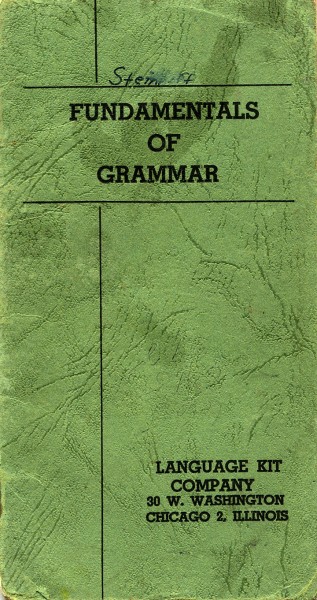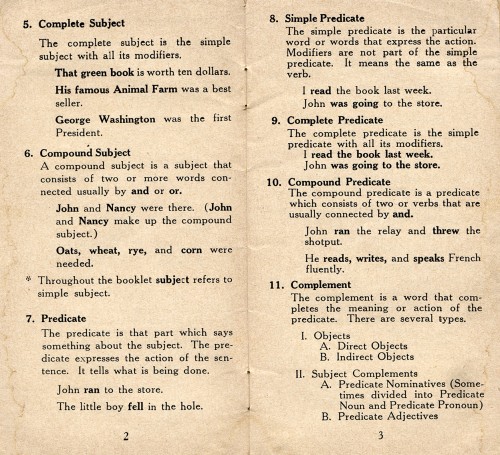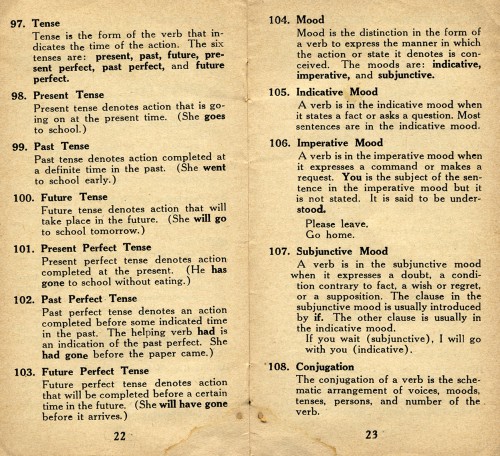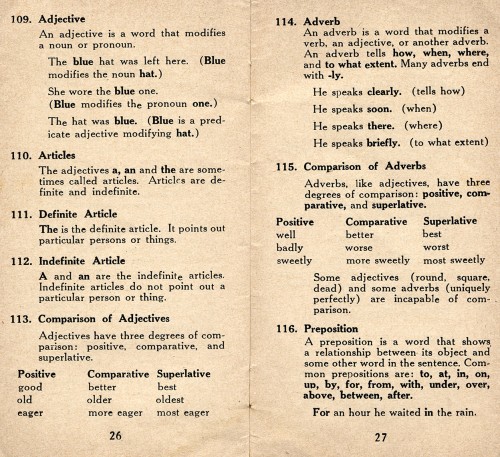 After I wrote about Dreaded Word Problems and the nightmares left over from math class, Anola Gill Stowick commented, “Ken, you have given rise to that huge lump in my throat that I thought dissolved sometime in my 40’s. Seriously, these look like the word problems our 5th grade granddaughter brings home when we’re babysitting overnight. I don’t do math, I only do English.”
After I wrote about Dreaded Word Problems and the nightmares left over from math class, Anola Gill Stowick commented, “Ken, you have given rise to that huge lump in my throat that I thought dissolved sometime in my 40’s. Seriously, these look like the word problems our 5th grade granddaughter brings home when we’re babysitting overnight. I don’t do math, I only do English.”
Well, I’m glad Anola has such fond memories of high school English, because I happened upon this English pocket reference guide at the same time I found the math books. I must have held onto it as my form of throwing salt over my shoulder to keep the elephants away. (To see what that means, go to the bottom of this post.)
Experimental English
 I was in what much have been some kind of experimental English class. We learned unconventional names for the parts of speech. All I remember was that one of them was called a “2-ing word.”
I was in what much have been some kind of experimental English class. We learned unconventional names for the parts of speech. All I remember was that one of them was called a “2-ing word.”
I don’t have a clue a 2-ing word is, but it must have been important enough that it stuck with me.
Looking at the book, I can figure out that “subject” probably meant “noun,” and “predicate” might translate to “verb. Once we got beyond those basics, though, I was in the weeds.
“Predictive Nominatives (sometimes divided into Predicate Noun and Predicate Pronoun)” is NOT an English phrase I can ever recall using. Maybe SOME folks would divide those things up, but I was basically, “can’t we all get along?” kind of guy not prone to either long or short division (because that sounded too much like math class).
You can click on the photos to make them larger if you REALLY want to revisit those days. Anola, I’m talking to you.
This REALLY made me tense
 Pages 22 and 23 made me tense, and it’s not because it “indicated the time of the action.” My head was swimming with Present Perfect, Past Perfect and Future Perfect tenses. I mean, what made them so all-fired perfect? Can’t we get by with Pretty Close Tense?
Pages 22 and 23 made me tense, and it’s not because it “indicated the time of the action.” My head was swimming with Present Perfect, Past Perfect and Future Perfect tenses. I mean, what made them so all-fired perfect? Can’t we get by with Pretty Close Tense?
Item 108? I didn’t even know we were ALLOWED to conjugate when I was in high school. That must have been what the kids in the non-2-ing word class were up to.
I got decent grades in writing
 The crazy thing about it was that I got good grades in English when it came to actually writing stuff, and I worked on newspaper copy desks where I had to whip reporters’ stories into readable form.
The crazy thing about it was that I got good grades in English when it came to actually writing stuff, and I worked on newspaper copy desks where I had to whip reporters’ stories into readable form.
If I kicked back a story, I didn’t tell the reporter that he had an incomplete throckmartin in the story about the couple caught conjugating on Cherry Hill; I’d just say, “This doesn’t make any sense. Please rewrite it.” It would come back with the throckmartin in the right place, then Rich Renfro would spike the story because “The Missourian doesn’t run stories about people conjugating.”
My writing style was – and is – to string together a bunch of quotes, then drop in a transition sentence or two from time to time to tie them together. I write like I talk, which causes debate coach and speech teacher Ruby Davis to whirl in her grave because I still type “warsh” from time to time.
I’m taking a break
I don’t watch a lot of TV, and when I do, it’s whatever I’ve set the TiVo to record or it’s streaming video. Last night when I went in to unwind, it dawned on me that everything that had been captured was a rerun – some that went back as far as 2010.
The networks are running old shows because nobody is sitting around watching TV at this time of year. My traffic stats show a similar dropoff on the blog, too.
I haven’t missed a day of posting in over a year, and that includes when I’ve been on the road trying to get a weak Internet connection in some No-Tell Motel. I need a break so I can figure out how I’m going to tackle some ambitious projects in 2015, and there’s no better time to do it than when you are distracted by friends and family.
I may post some reruns between now and the first of the year so you don’t go into withdrawals (and so Mother doesn’t nag me about slacking off).
I want to thank those folks who have used the yellow Donate button at the top left of the page. I appreciate your support and wish you and yours a Merry Christmas and Happy New Year.

English is my second language, so I had a hard time in school and still do expressing myself and speaking and using it correctly. I do remember this book. Experimental was a word used a lot in the 60’s, we also had experimental math with Grace Williams too. Oh, my first language was Swampeast Missouri which only comes back when I get tired or have long meeting with Jim Beam or Captain Morgan. Merry Christmas to all. or in my native tongue, Merry CHRISTMAS you all.
Was in hutsons furniture store Monday. Close to front of store in an “office” setting was a large display of textbook . My wife, Connie Wills” class of 64 spitted one that she said looked like her French text. She pulled it out opened it up sure enought CC textbook rental stam . Along with some names. One of which was Albert Spradling
For some inexplicable reason, I performed very well in English classes and understood all the complexities of grammar, sentence structure and paragraph structure. The same thing happened when I took French classes and ultimately all of the computer languages that I learned.
The thing that amazes me most is that someone would still have in their possession textbooks from high school.
This is exactly what we’re teaching in a homeschool class for 4th through 6th graders. In the early elementary years the students learn basic definitions of grammatical terms. Putting them to music and singing them helps a lot. Young children are sponges and can memorize mountains of material that way. Then when they reach 4th grade we begin explaining what it all means, even teaching them to diagram sentences! They repeat the class three times so the material really sinks in. My 6th grade son is a whiz at it!
Ken, would it be alright if I printed these pictures to share with my homeschool class?
Becky, interestingly enough, the Language Kit Company Fundamentals of Grammar shows up on Amazon at this link. It has the same 1962 copyright date as my booklet, so you could pick up the whole shebang there.
Well, after all of these decades, I feel I can exhale now. I see I’m not the only one who made good grades in most subjects, but simply could not understand English grammar. I was a great speller, a top reader, but I simply could not understand grammar. I remember when I was in Northeastern Italy I used to write long ten or more page letters to my first cousin Jackie Lacey. Jackie was an English major at the university. One time she wrote me back and told me that she really enjoyed me telling her what I was seeing and doing in Italy, but there was not a single piece of punctuation in the entire more than ten page letter. I told her to just read until she felt it was time to stop for a second then go on. I was secretly embarrassed though. So I went out to the book store and purchased English 2600. It was a programmed learning book. It started off with something like “Clyde ran” Then it would ask me what part of the sentence is “Clyde” and what part is “Ran” Each frame added a little more complexity. I made it through the entire 2600 frames. Then I purchased English 3200 grammar. It worked the same way, but it started where 2600 left off and became more and more complex. We didn’t have computers and online learning back in the sixties and seventies so this was the only thing I could do. It helped me a tremendous amount. So I think my grammar today may be at the “C” level, or even higher if you grade me on a curve, comparing how others write and talk today, but I will never be as fluent as so many people are that I know. I also managed to take two years of French and two years of Italian when I lived over there, but my grammar in those languages is equally bad. I had a wonderful Italian friend named Laura Rossi who was an English teacher. She enjoyed making fun of my English. I knew she was teasing me, but it was odd to me that she spoke English better than I did. Now when I watch television, I see so many foreigners speaking perfect English, but at this point I just shrug and say to Hell with it. I am contented with the knowledge that according to my Chemistry classmates I had the highest overall score for the year in Chemistry that anyone had ever scored up to that time. My average was about 98% for the year. I was extremely proud of that as all of the brainiest people in my class did less well than I did. To this day I have no idea why Chemistry was so easy for me.
And so it goes! Buon Natale e felice anno nuovo tutti! 🙂 Let’s hope we all prosper physically, mentally and financially in two thousand and fifteen.
ImHotep. 🙂
Ken, take some time and enjoy your family during the holidays (BTW, family and friends are NOT a distraction, annoying maybe, but not a distraction). I have the nuns to thank for my base language skills . . . Diagram, diagram, diagram! We were not made to write, “I will not talk in class.” A hundred times. Rather, we had to diagram scores of sentences. My love of literature was inspired by Arlene Sadler; best teacher I ever knew including college. People who came out of the Cape school system have no idea how lucky we were. Also, improper English was considered worse than swearing in our house. Using the wrong tense or dangling a participle brought adult reactions like the scene in ‘Christams Story’ when Ralphie says the ‘F’ word. Happy holidays, my friends.
My guess is the to-ing (2-ing) words were infinitives. “To” followed by a verb is an infinitive. Infinitives can function as nouns, adverbs, or adjectives.
That sounds logical (even thought I really don’t have a clue what you are talking about).
Thanks for printing the grammar rules and descriptions. Funny, was in a conversation with my 43 year old daughter the other day in re: to parts of speach and diagramming sentences. Was trying to remember the correct definitions. I loved parts of speach and diagramming sentences when I was in school, but realized how long ago that had been when I could not remember the proper descriptions!! I will keep this blog to refresh my memory!!
Have a great deserved vacation for a few days!! Have a blessed New Year!
The company is still in business, so I decided not to print more than a few examples from the book. It was very well done.